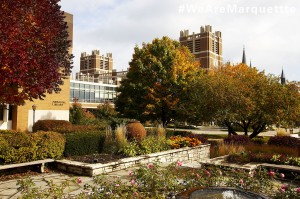
If you’ve never visited the Tolkien Collection or are unaware of the contents of the archive, this two-part report from Tolkienist and Norse mythologist Dr Karl Seigfried documents just some of the literary treasures it holds.
Enjoy!
Tolkien archives field trip
On October 26, I led a group of my students on a field trip to see the J.R.R. Tolkien Collection at Marquette University in Milwaukee. Like the Viking ship field trip earlier in the month, the excursion was open to students in my Norse religion class at Carthage College, members of the Carthage College Tolkien Society that I started last year, and students from my class at Chicago’s Newberry Library on “The Hobbit: J.R.R. Tolkien’s Mythic Sources.”
The trip was organized by Laura Schmidt, archivist at the Marion E. Wade Center and staff advisor for the Wheaton College Tolkien Society. She kindly invited me to help set up the joint trip for my students from the two institutions and the members of her Wheaton College group.
History & holdings of the J.R.R. Tolkien Collection
In 1956, Marquette University hired Wales-born William B. Ready as director of libraries and gave him the task of collecting materials for the school’s new Memorial Library, which had been completed in 1953. Ready had come to the United States after World War II and worked at Stanford University before heading Marquette’s libraries. He believed that each institution should have a collection policy focusing on specific specialties. Since Marquette is a Jesuit university, he decided to focus on Roman Catholic writers and set his sights on acquiring the works of Tolkien, a Catholic author then heading into the mania of American popularity that gave rise to the “Frodo Lives!” phenomenon in the 1960s.
In his first year, Ready contacted Tolkien through a London antiquarian book dealer named Bertram Rota. As no institution had ever asked to purchase Tolkien’s manuscripts, the author quickly agreed to sell the material to Marquette for £1500. Using the retail price index, this amount would be approximately £30,000 today, or nearly $50,000. At the time, it was about equal to a year’s salary for Tolkien.
In 1957, the materials relating to The Hobbit, Farmer Giles of Ham and Mr. Bliss arrived in Wisconsin. Tolkien was scheduled to speak at Marquette during the year that these first manuscripts were delivered but canceled due to his wife’s health issues. In 1958, the manuscripts of The Lord of the Rings arrived. Tolkien canceled another scheduled Milwaukee talk in 1959, again due to his wife’s condition.
In 1965, Tolkien wrote to William A. Fitzgerald, the new library director. The American publisher Ace Books was releasing a pirated paperback edition of The Lord of the Rings, which had only been available in hardcover to that point. Tolkien and his publishers had decided to come out with their own authorized paperback edition to compete with the bootleg. While revising the text for the new publication, Tolkien had found further original manuscripts of the work. He told Marquette’s library director that these manuscripts should come to the archives. However, Christopher Tolkien would eventually use these manuscripts while compiling books six through nine of his monumental History of Middle-earth, and these earliest drafts of The Lord of the Rings would not be forwarded on to Marquette until the 1980s.


